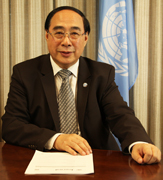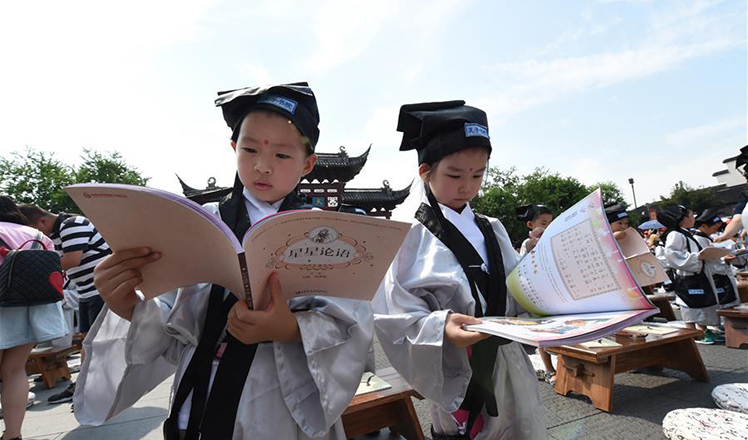China will deliver on G20: official
Updated: 2016-09-01 11:26
By Wang Linyan in New York(China Daily USA)
|
|||||||||
Holding the G20 summit in Hangzhou, China is "truly historic" and China's G20 presidency will live up to high expectations from the international community, said a senior United Nations official.
"Under the leadership of the Chinese presidency, the G20 this year has sent a clear signal that there can be no sustained and inclusive economic growth without continued economic progress in the developing world," said Wu Hongbo, undersecretary-general for economic and social affairs at the United Nations.
 |
|
Wu Hongbo, undersecretary-general for economic and social affairs at the United Nations |
It is the first time that a member of the UN Group of 77 developing countries has hosted a G20 summit. The theme is "Towards an innovative, invigorated, interconnected and inclusive world economy".
"The Hangzhou Summit will feature the strongest representation of developing countries of any G20 summit held so far," said Wu, citing the Chinese presidency's invitation to Thailand, the Chair of the Group of 77, to attend the summit as an example.
As China has made sure that the G20 aligns its work with the new UN development agenda, Wu said that the G20 summit will directly contribute to "the full and timely implementation" of the 2030 Agenda for Sustainable Development.
The agenda, which aims to eradicate poverty by 2030, was adopted by world leaders last year. The Chinese government is also making a strong commitment in the outline of its 13th Five-Year Plan (2016-20) to promoting the 2030 Agenda domestically.
With the global economy still facing slow growth, Wu said it's very important that the G20 commits to lifting its growth by 2 percent by 2018.
China is promoting priority areas and guiding principles designed for structural reform of G20 members, which is vital for achieving this goal.
Finance Minister Lou Jiwei said last week in Beijing that G20 finance ministers and central bank governors have reached a consensus on global cooperation.
"The extent to which this goal can be successfully achieved will depend on cooperation among countries," said Wu.
For example, a well-coordinated fiscal stimulus by a group of large, developed countries and emerging economies would be much more effective in boosting global growth than unilateral fiscal stimulus introduced by a single country, Wu explained.
"The G20 summit can chart out pathways to strengthen much needed macroeconomic policy coordination," Wu said.
He pointed out that it is also critical to not only address the short-term challenges to growth but also direct attention toward medium- and long-term sustainable and equitable growth paths.
Under China's presidency, the G20 is implementing an enhanced structural reform agenda, encouraging innovation and competition to boost growth potential and promoting the G20 Action Plan on the 2030 Agenda to achieve sustainable growth.
"China has demonstrated that the three dimensions of sustainable development - economic, social and environmental - are mutually reinforcing by building a world-leading renewable energy sector that creates jobs, fosters technological innovation and improves energy access," Wu said.
To Wu, China has been "the locomotive of global growth", contributing to more than one-third of world output growth during 2008-2015.
In the aftermath of the global financial crisis, it has played a critical role in sustaining global output, particularly for developing economies. It is also now the top trading nation in the world and is the biggest bilateral trading partner for many economies.
China will continue to be a key engine of global growth as it gradually transitions into a consumption-driven economy and demands more goods and services from the rest of the world and as its investments abroad continue to rise, Wu said.
China's nonfinancial outward foreign direct investment has been rising significantly, reaching $118 billion in 2015.
|
|
|
Ambassador Carla A. Hills, chair and CEO of international consultancy Hills & Co |
Those are: breaking a new path for growth, more effective and efficient global economic and financial governance, robust international trade and investment, and inclusive and interconnected development.
"I am hoping that China will lead by example and take steps to implement these priorities," Hills, former US trade representative, said in a written interview with China Daily.
"As one of the world's two largest economies and as host of this 11th G20 summit, it has the opportunity to press for action that will not only further strengthen its economy but contribute to the growth and development of the global economy," she said.
She said past experience has shown that one of the most effective tools to generate global economic growth for the benefit of both rich and poor nations is to open world markets to trade and investment.
Notwithstanding the fact that at every past G20 meeting the leaders have pledged their commitment to maintain an open global economy, according to the last World Trade Organization (WTO) monitoring report covering mid-October 2015 to mid-May 2016, the G20 economies in that six-month period have applied 145 new trade restrictions, roughly 21 new measures a month, Hills said.
"I would hope that there would be a real commitment by each and every leader not only to refrain from implementing further restrictions but also to remove those they have put in place," she said.
wanglinyan@chinadailyusa.com
- Record number of Americans dislike Hillary Clinton: poll
- Mexico contradicts Trump on paying for border wall, clouding visit
- First direct commercial flight from US in over 50 years arrives in Cuba
- Typhoon kills 9 in Japan's old people's home as toll hits 11
- Brazil leader's impeachment trial enters final stretch
- 94th anniv. of Victory Day marked in Turkey

 Korean ethnic dance drama shines in Beijing
Korean ethnic dance drama shines in Beijing
 Children explore science and technology at museum
Children explore science and technology at museum
 Children wearing Hanfu attend writing ceremony
Children wearing Hanfu attend writing ceremony
 73rd Venice Film Festival opens in Italy
73rd Venice Film Festival opens in Italy
 'World's most dangerous village' draws visitors
'World's most dangerous village' draws visitors
 Chinese female pilots fly fighter-bomber JH-7
Chinese female pilots fly fighter-bomber JH-7
 African trainees learn lion dance in NE China's Dalian
African trainees learn lion dance in NE China's Dalian
 Left-behind children back to hometown after spending summer with family
Left-behind children back to hometown after spending summer with family
Most Viewed
Editor's Picks

|

|

|

|

|

|
Today's Top News
Trump outlines anti-terror plan, proposing extreme vetting for immigrants
Phelps puts spotlight on cupping
US launches airstrikes against IS targets in Libya's Sirte
Ministry slams US-Korean THAAD deployment
Two police officers shot at protest in Dallas
Abe's blame game reveals his policies failing to get results
Ending wildlife trafficking must be policy priority in Asia
Effects of supply-side reform take time to be seen
US Weekly

|

|










